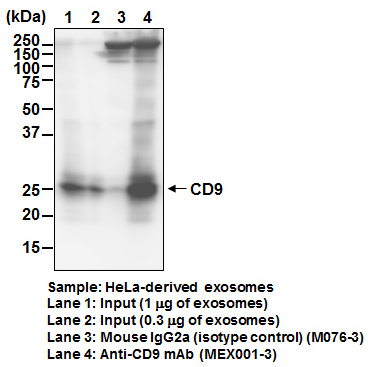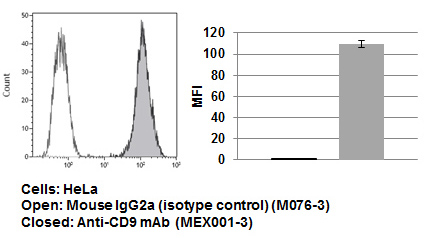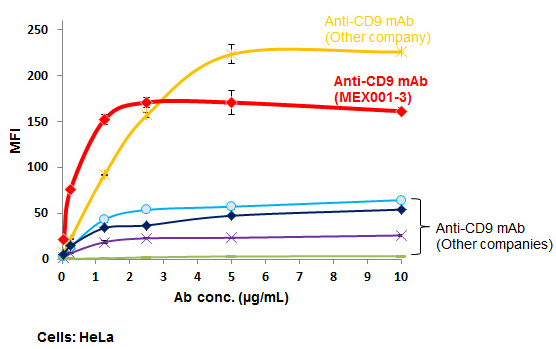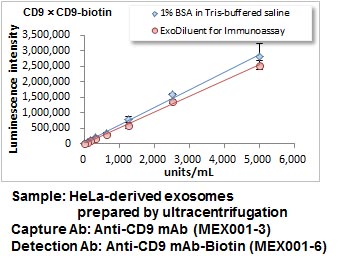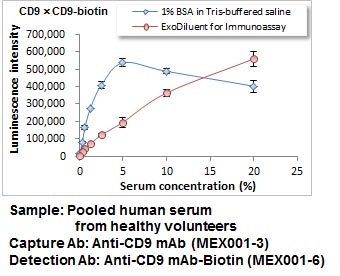This site is for customers in Asia.
Customers in China & other regions, please go to Global page.
HOME >
Product search results > Code No. MEX001-3
Anti-CD9 mAb
| Data | |||||
|---|---|---|---|---|---|
| Clonality | Monoclonal | Clone | A100-4 | ||
| Isotype (Immunized Animal) | Mouse IgG2aκ | ||||
| Applications |
|
||||
| Immunogen (Antigen) | human prostate carcinoma cell line (PC3) derived exosomes (prepared by ultracentrifugation from cultured supernatant) | ||||
| Reactivity [Gene ID] | |||||
| Storage buffer | 1 mg/mL in PBS/50% glycerol, pH 7.2 | ||||
| Storage temp. | -20°C | Conjugate | Unlabeled | Manufacturer | MBL |
| Alternative names | 5H9, BA2, BTCC-1, DRAP-27, GIG2, MIC3, MRP-1, P24, TSPAN29 | ||||
| Background | CD9, a member of the tetraspanin or transmembrane 4 super family (TM4SF; CD37, CD53, CD63, CD81, CD82, etc) of proteins, is widely distributed on the surface of a variety of hematopoietic and epithelial cell types. Several members of the tetraspanin family, including CD9, form noncovalent associations with integrins, particularly β1 integrins. CD9 and other tetraspanins have been postulated to participate in the regulation of cell growth, motility, and signaling via their physical association with integrins. CD9 has broad tissue distribution and may play multiple roles in a variety of cellular processes such as immune response and tumorigenesis, but its function has not been elucidated entirely. It is reported that the tetraspanins CD9, CD63 and CD81 are highly enriched on a certain type of extracellular vesicles, called exosome. Because of various exosome features, CD9, one of the representative exosome surface proteins, is thought to be related to cell-cell communication. | ||||
| Related products | D263-3 Anti-CD63 (LAMP-3) (Mouse) mAb M076-3 Mouse IgG2a (isotype control) M077-3 Mouse IgG2b (isotype control) MEX002-3 Anti-CD63 (LAMP-3) mAb MEX003-3 Anti-CD81 (TAPA1) mAb 3190 Magnetic Rack MJS002V2 Protein G-Magnetic Beads MEX001-6 Anti-CD9 mAb-Biotin MEx002-6 Anti-CD63 (LAMP-3) mAb-Biotin MEX003-6 Anti-CD81 (TAPA1) mAb-Biotin MEX001-4 Anti-CD9 mAb-FITC MEX002-4 Anti-CD63 (LAMP-3) mAb-FITC MEX003-4 Anti-CD81 (TAPA1) mAb-FITC MEX001-12 Anti-CD9 mAb-ALP MEX002-12 Anti-CD63 (LAMP-3) mAb-ALP MEX003-12 Anti-CD81 (TAPA1) mAb-ALP |
||||
| Citations |
Other(Immunocaputre of exosome)
|
||||
| References |
|
||||
| Product category |
|
||||
- The availability is based on the information in Japan at 17:00, Apr 26, 2024 in JST.
- The special price is shown in red color.
- Please note that products cannot be ordered from this website. To purchase the items listed in this website, please contact us or local distributers.
- Abbreviations for applications:
WB: Western Blotting, IH: Immunohistochemistry, IC: Immunocytochemistry, IP: Immunoprecipitation
FCM: Flow Cytometry, NT: Neutralization, IF: Immunofluorescence, RIP: RNP Immunoprecipitation
ChIP: Chromatin Immunoprecipitation, CoIP: Co-Immunoprecipitation - For applications and reactivity:
*: The use is reported in a research article (Not tested by MBL). Please check the data sheet for detailed information.
**: The use is reported from the licenser (Under evaluation or not tested by MBL).
- For storage temparature: RT: room temparature
- Please note that products in this website might be changed or discontinued without notification in advance for quality improvement.













 Citations
Citations Data Sheet
Data Sheet


